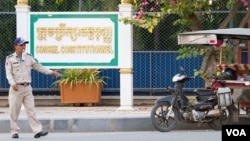The Constitutional Council has approved further amendments to the political parties law that will make it illegal for the opposition Cambodia National Rescue Party to associate with its former president.
On Tuesday, the Council issued a statement confirming the signing off on the amendments, which were passed by a unanimous vote in the National Assembly on July 10.
Im Chhun Lim, director of the Council, said in the statement that there would be “no further alterations” to the law which would be “effective and listed in the constitution.”
The CNRP boycotted both the parliamentary and Senate votes this month. The new rules mean that if the CNRP is seen to be associating with its former president, Sam Rainsy, it could face legal action and even dissolution.
Son Chhay, a senior CNRP lawmaker, said the Constitutional Council was staffed by ruling Cambodian People’s Party members and was little more than a rubber stamp for the decision of the party in the National Assembly and Senate.
“If the Council examined the law thoroughly, the decision would not be the same. Thus, I hope that institutions such as the Council could be more liberated and independent in the future,” he said.
As a result of the passage of the amendments, the CNRP had opted to change the signage it has erected around the country, which currently depicts the party’s current leader, Kem Sokha, shaking hands with Rainsy.
Last week, a group of 19 rights groups issued a highly critical report contending that the amendments would further restrict freedom of association and expression.
Yoeung Sotheara, a legal officer with election monitor Comfrel, said: “As civil society, we still see it as a restriction of freedoms.”
Uth Chhorn, Council spokesman, could not be reached.
Leng Peng Long, National Assembly spokesman, said the law would not be sent to the Royal Palace for approval before its final passage at the National Assembly next week.
In February, the CPP passed amendments to the law that prohibited political parties from being led by politicians with criminal convictions, effectively banning Rainsy, who was convicted of defamation several years ago, from leading the party. Rainsy stepped down shortly before the amendments were passed, but has continued to advocate publicly for the party’s interests from self-imposed exile in France.




